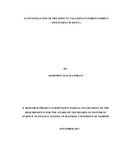| dc.description.abstract | In recent years, the globalization process has led to the emergence of new issues. Not only have companies tended to become more mobile, but also governments have to deal with this new dimension in the design of their national tax policy. The gradual elimination of barriers to capital movements have stimulated governments to compete for FDI in global markets as well as reinforced the role of tax policy in this process. The empirical evidence on whether tax differences influence the location of FDI is reviewed by Hines (1997), but the evidence is rather mixed. The studies cited show a lack of universal agreement concerning which factors drive FDI in which countries and the nature of the relationships of taxation with FDI. The purpose of the study is to investigate the effect of taxation on foreign direct investment in Kenya. This study adopted a descriptive research design. It was a time series correlation study with the values of FDI as the dependent variable while the independent variables was taxation with exchange rates, taxes, inflation, levels of GDP rate and openness being the moderating variables. The target population composed of Investment Promotion Centre and Chamber of Commerce and industry. Secondary data involved the collection and analysis of published material and information from other sources such as the Kenya National Bureau of Statistics. The sample data for this study was for the period spanning 1992 to 2002. This study used regression analysis model in which the dependent variable was the percentage annual percentage change in FDI inflows to Kenyans. From the study findings and discussion, the study concludes that taxation affect the level of inflow and the location of foreign direct investment. The study recommends that policy planners and implementers should put in place effective mechanisms to control inflation because inflation has a direct effect on FDI inflows in Kenya. It should be established which behavioural factors affect FDI inflows into Kenya. | en |

